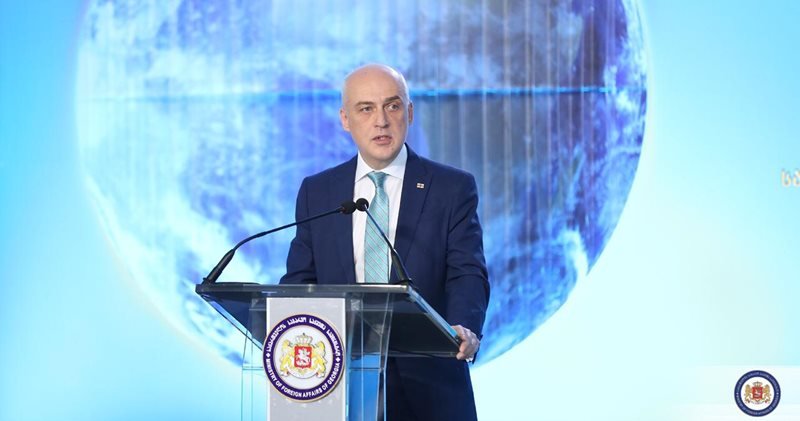Top Georgian diplomat David Zalkaliani presented on August 9 a 10-year action plan of the Foreign Ministry, determining where the country is heading to in the coming decade.
The plan titled “Foreign Policy Focused on Western Values and the Country’s Interests: 10-year Vision, 10 Goal” lays out 10 key goals covering de-occupation, the EU and NATO membership aspirations, bilateral partnerships, regional cooperation, relations with Russia, and other foreign policy issues.
“The paramount goal before us is to restore Georgia’s sovereignty and territorial integrity and to achieve membership of the EU and the North Atlantic Alliance – the historic choice of the Georgian people enshrined in the Constitution of Georgia,” said Minister Zalkaliani at the presentation.
In his address that comes amid the 13th anniversary of the August War, the Georgian FM also discussed the Russian aggression on Georgia in 2008, as well as ongoing challenges posed by the Russian occupation of Abkhazia and Tskhinvali/South Ossetia regions.
“It is absolutely unacceptable and inconceivable that in the 21st century the occupying force is building new Berlin walls in the midst of Georgia, to the east of Europe,” the Minister went on, adding that Georgia, through the effective engagement of the international community, “spares no efforts” to achieve de-occupation, peaceful resolution of conflicts, reconciliation of occupation-torn communities, and the unification of the country.
The ten goals to be achieved in ten years as per the plan are as follows:
- Launching “irreversible” process of the country’s de-occupation and achieving “substantial progress” towards strengthening Georgia’s sovereignty and restoring its territorial integrity by 2030;
- Applying for the EU membership by 2024, obtaining membership candidate status by 2030, and opening membership talks with the 27-member bloc;
- NATO membership plan developed with the Alliance, full preparedness for the NATO’s “political decision” to make Georgia its member;
- Achieving tangible results “in terms of upgrading the high-level formats of bilateral relations to a new strategic level” to contribute to pursuing diverse domestic and foreign policy interests;
- The establishment of a comprehensive U.S.-Georgia alliance reinforced by military-political and trade-economic components;
- The establishment of the South Caucasus “as an area of cooperation, good neighborhood and dynamic development overcoming existing differences” through “a well-balanced and mutually beneficial regional policy based on partnerships;”
- Emergence of the possibility of normalization of political ties with Russia in accordance with the principle of de-occupation and the territorial integrity of Georgia – the beginning of the real process of conflict resolution.
- Launching an EU-Georgia connectivity dialogue, establishing Georgia as a regional leader and “assuming the important function of a bridge connecting the East and the West;”
- Achieving enhanced investment capacities, effective implementation of national, regional and international economic projects, preferential treatment for Georgian export goods and diversified export markets;
- A further strengthened diaspora with successful cultural and educational centers abroad by 2030.
Also Read:
- Parliament Adopts Foreign Policy Resolution
- Georgia Calls on Russia to Reverse Abkhazia, Tskhinvali Recognition
- Int’l Reactions as Georgia Marks 13 Years Since Russian Invasion
This post is also available in: ქართული (Georgian) Русский (Russian)

